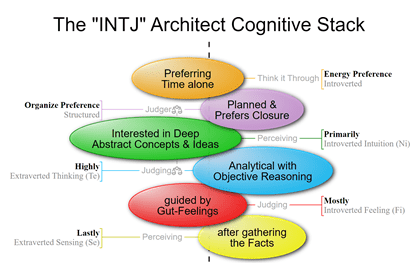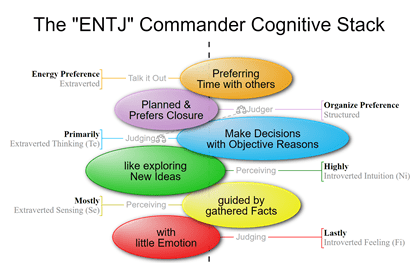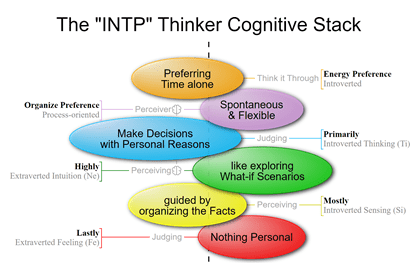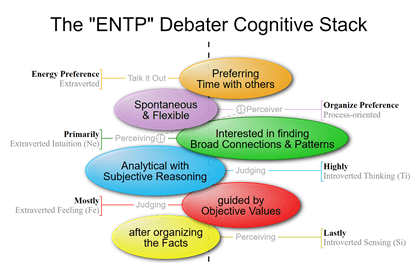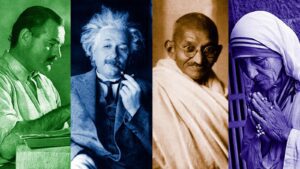
What is the Keirsey “Rational” Personality Temperament?
Rationals have an Abstract Communication style and a Utilitarian Action Style. They talk primarily about new problems that intrigue them and what new solutions they envision. Rationals are pragmatic and act as efficiently as possible to achieve their objectives, ignoring arbitrary rules and conventions.
- Rationals tend to be pragmatic, skeptical, self-contained, and focused on problem-solving and systems analysis.
- Rationals pride themselves on being ingenious, independent, and strong-willed.
- Rationals make reasonable mates, individualizing parents, and strategic leaders.
- Rationals are even-tempered; they trust logic, yearn for achievement, seek knowledge, prize technology, and dream of understanding how the world works.
- Rationals want to be good at their work and achieve mastery without being pushed.
- Rationals are great at strategy and excel in tasks that involve engineering, theorizing, coordinating, and developing concepts.
- Rationals love details, are very analytical, and pursue knowledge for knowledge’s sake.
- Generally, they are more analytical or left-brain dominant.
Keirsy Rational Personality Type cross-reference
- Temperament Type – Choleric
- Animal Type – Lion
- DISC Type – Dominant
- Socio-Communicative Type – Driver
- True Colors – Green
- Color Code – Red
- Personality Compass – North
- Occupational Type – Enterprising
- Learning Type – Activist
- Leadership Type – Dominator
Keirsy Rational Correlated MBTI Intuition/Thinking (NT) Types
Keirsey classified the Rational as Abstract/Intuition with Thinking (xNTx) MBTI Personality Types. These include the Types with Intuition and Thinking as the first Dominant or second Auxiliary Functions in either order.
- The Mastermind (INTJ) is a coordinator who excels in arranging and entailing.
- The Field Marshal (ENTJ) is a coordinator who excels in arranging and mobilizing.
- The Architect (INTP) is an engineer who excels in constructing and designing.
- The Inventor (ENTP) is an engineer who excels in constructing and devising.
INTJ and ENTJ Judging MBTI Types are Rational with Introverted Intuition and Extraverted Thinking as the first Dominant or second Auxiliary Functions in either order.
INTP and ENTP Perceiving MBTI Types are Rational, with Extraverted Intuition and Introverted Thinking as the first dominant or second auxiliary Functions.
Keirsy Rational Enneagram Types
- Type 1 – The Reformer (ENTJ, INTJ)
- Type 3 – The Achiever (ENTP)
- Type 5 – The Investigator (INTJ, INTP)
- Type 7 – The Enthusiast (ENTP)
- Type 8 – The Challenger (ENTJ)
What are the Keirsy Personality Temerpaments?

David Keirsey, born in 1921, was an American psychologist specializing in conflict management and family counseling. He began researching human behavior and Personality in the 1940s.
Keirsey blended the Myers-Briggs Personality Types with Ernst Kretschmer’s model of the Four Temperaments, developing the Keirsey Temperament Sorter, which was made famous by his book “Please Understand Me.”
Instead of using the term Personality, Keirsey used Temperament. He viewed it as a configuration of observable Personality Traits, communication habits, patterns of action, characteristic attitudes, values, and talents. To Keirsy, Temperament encompasses personal needs, individual contributions, workplace contributions, and societal roles.
Keirsey organized his Four Temperaments as a matrix and named them as suggested by Plato: Artisan (Iconic), Guardian (Pistic), Idealist (Noetic), and Rational (Dianoetic).
The matrix is divided in half vertically by Communication Styles: Concrete versus Abstract. The matrix is divided horizontally into two action styles: Cooperative and Utilitarian.

Learn more about the Keirsey Temperaments.
Concrete versus Abstract Communication Style
Some people are focused and like to talk primarily about the external, concrete world of everyday reality: facts and figures, their work, home, family, the news, sports, and weather—all the who, what, when, where, and how things in their lives.
Other people primarily like to talk about the internal, abstract world of ideas: theories and conjectures, dreams and philosophies, beliefs and fantasies — all the whys, ifs, and what might be in life.
For the most part, Concrete people talk about reality, while Abstract people talk about ideas.
According to Keirsey, everyone can engage in both observation and introspection. People are observant when they touch objects or otherwise perceive the world through their five senses. When people reflect and focus on their internal world, they are introspective.
However, individuals cannot simultaneously engage in observation and introspection. The extent to which people are more observant or reflective affects their behavior.
Observant people focus on practical matters such as food, shelter, and their immediate relationships. Carl Jung used “Sensation” to describe people who prefer Concrete perception.
Reflective people are more ‘head in the clouds’ and abstract in their views. They focus on global or theoretical issues such as equality or engineering. Carl Jung used the word Intuition when describing people who prefer Abstract perception.
Keirsey’s two Communication Styles, Abstract versus Concrete, are similar to the Myers-Briggs “Perceiving” Cognitive Functions, Intuition (Abstract) and Sensing (Concrete).
Cooperative versus Utilitarian Action Style
Some people act practically and pragmatically; that is, they do what gets results, what achieves their objectives as effectively or efficiently as possible. They only check afterward to see if they observe the rules or go through the proper channels. People with this behavior have a Utilitarian Action Style.
On the other hand, some people act primarily cooperatively and socially acceptable; they try to do the right thing in keeping with agreed-upon social rules, conventions, and codes of conduct. Only later do they concern themselves with the effectiveness of their actions. People with this behavior have a Cooperative Action Style.
Utilitarian people mostly do what works, while Cooperative people do what’s right.
Cooperative-type people pay more attention to other people’s opinions and are more concerned with doing the right thing. Meanwhile, Utilitarian-type people pay more attention to their thoughts or feelings and are more concerned with doing what works.
The two Cooperative Temperaments are the Idealists (Cooperative and Abstract) and Guardians (Cooperative and Concrete).
The two Utilitarian Temperaments are the Rational (Pragmatic and Abstract) and the Artisan (Pragmatic and Concrete).
Neither the MBTI nor Jung has a corresponding or comparable dichotomy to the Keirsey Action Style classification. Action Style significantly differs between Keirsey’s Temperaments and Myers and Jung’s work in Cognitive Personality Styles.
Keirsy Rational Personality Temperament
Rationals are the problem-solving Temperament, mainly if the problem concerns the many complex systems that make up the world around us.
Rationals might tackle problems in organic systems, such as plants and animals, mechanical systems like railroads and computers, or social strategies like families, companies, and governments. Whatever systems fire their curiosity, rationalists will analyze them to understand how they work so they can figure out how to make them work better.
In working with problems, Rationals try to find solutions that have applications in the real world. Still, they are even more interested in the abstract concepts, fundamental principles, or natural laws underlying the case. And they are entirely pragmatic about their ways and means of achieving their ends.
Rationals don’t care about being politically correct. They are interested in the most efficient solutions possible. They will listen to anyone with something valuable to teach them while disregarding any authority or customary procedure that wastes time and resources.
Rationals have an insatiable hunger to accomplish their goals and will work tirelessly on any project they have decided on.
Rationals are rigorously logical and fiercely independent in their thinking—indeed, they are skeptical of all ideas, even their own—and believe they can overcome any obstacle with willpower.
Rationals can be cold and distant, but this is due to their concentrated attention to the problem they’re working on.
Whether designing a skyscraper or an experiment, developing a theory or prototype technology, building an aircraft, a corporation, or a strategic alliance, Rationals value intelligence in themselves and others and pride themselves on the ingenuity they bring to their problem-solving.
Rationals are scarce, comprising as little as 5 to 10 percent of the population. But because of their drive to unlock nature’s secrets and develop new technologies, they have done much to shape our world.
Famous Rationals
Albert Einstein, Marie Curie, Bill Gates, Margaret Thatcher, Walt Disney, Camille Paglia, Ayn Rand, Thomas Jefferson, Richard Feynman, General Ulysses S. Grant, and President Dwight D. Eisenhower are examples of Rational Type people.

